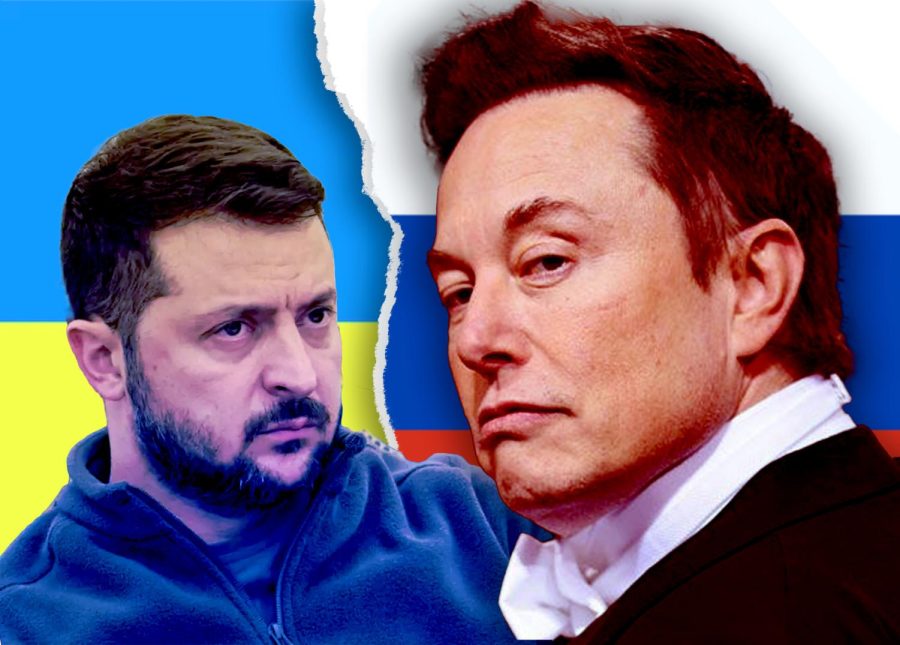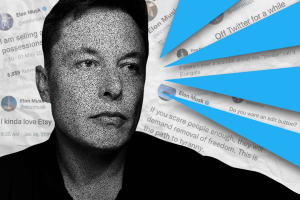Elon Musk Carelessly Indulges in Foreign Policy
The world’s richest man faced backlash when he determined that war in Ukraine is not profitable enough
November 16, 2022
Elon Musk became the wealthiest person in the world on Oct. 25, 2021. Five months later, Vladimir Putin mobilized Russian troops and invaded Ukraine. Shortly after, SpaceX (Musk’s privately owned space flight company) began providing a newly invaded Ukraine with its global internet service: Starlink. Since then, Starlink satellites have become crucial to frontline communication in Ukrainian resistance efforts against Russian invasion. However, the security of Ukraine’s internet access was threatened on Friday, Oct. 14, 2022, when Musk tweeted that SpaceX could not “fund the existing system indefinitely.”
This declaration came days after the billionaire sparked outrage with a Twitter poll urging Ukraine to reach a peace agreement with Russia by ceding Crimea. By encouraging additional Crimean elections and claiming the separation of Crimea from Russia was a “mistake,” Musk implied the citizens of Crimea actually desire to belong to Russia.
The Crimean peninsula was annexed by Russia in 2014 but remains internationally recognized as Ukrainian territory. Crimea’s ethnic makeup is diverse and includes large populations of both Russians and Ukrainians. Putin uses the presence of Russians in Crimea to claim that the peninsula should belong to Russia per popular demand, an argument Musk has also adopted. However, previous referendums overseen by the Kremlin in this region have been denounced by Ukraine as rigged through coercion and Russian threats of violence. Ukrainian officials contend that the majority of Ukrainian citizens do not want to belong to Russia.
Ukrainian President Volodymyr Zelenskyy responded to Musk by publishing his own Twitter poll asking users if they would prefer Musk supported Russia or Ukraine. Ukrainian diplomat Andriy Melnyk even told Musk to “f— off” via Twitter. When asked why he threatened Starlink, Musk tweeted that he was just following Melnyk’s recommendation. This petty Twitter controversy happened amid Musk’s purchase of the social media platform and after an alleged meeting with Putin. Musk continues to deny Eurasia Group President Ian Bremmer’s claims that he spoke with Putin about Ukraine preceding his tweet encouraging the surrender of Crimea. However, the billionaire’s “peace” advocacy was swiftly rejected and labeled Kremlin propaganda by antiwar proponents and Ukrainian officials, and it was praised by prominent Russian imperialists.
After widespread public backlash, Musk retracted his request for the U.S. military to take on the cost of funding Starlink, tweeting sarcastically that “even though Starlink is still losing money & other companies are getting billions of taxpayer $, we’ll just keep funding Ukraine govt for free.” It’s important to note that 85% of the 20,000 Starlink terminals in Ukraine are already being paid for in part by countries like the U.S. and Poland. Musk likes to imply that he’s selflessly bearing the brunt of the cost, but in reality major powers are supporting the expensive endeavor. It appears as though Musk only tried to back out of his commitment because the violent humanitarian crisis in Ukraine was not profitable enough for the man who just bought Twitter for $44 billion.
This contentious situation brings a broader issue into question: Why does an individual billionaire feel entitled to involve his company in foreign policy? How can the fate of a country at war be influenced by the will of one man? How has the U.S. created an atmosphere in which an American celebrity believes himself qualified to potentially cripple a resistance movement overseas?
Musk’s crass impulsivity is one of many examples in which the idolization of the exorbitantly rich has adverse social or political consequences. Rather than look to our government and elected officials to implement meaningful, material solutions, many prefer relying on the charity of corporate America. Billionaire fan clubs, such as those that venerate Elon Musk, expect these innately exploitative men and their corporations to solve society’s most pressing problems, ignoring how unqualified they may be.
Musk got involved during the early stages of the Russia-Ukraine conflict. He was celebrated for his apparent selflessness but quickly trivialized one of the most blatant cases of violent imperialism since the 20th century as soon as it became unprofitable. Elon Musk is aware of the rigged elections and intimidation taking place in Crimea, and presumably, he fully understands the increased violence that would ensue should Ukraine cede Crimea. Still, he used his influence to threaten Ukraine’s internet access after publishing a Twitter poll publicly announcing his support for these elections — and therefore, for the Kremlin agenda.
Just as the majority of the world’s wealth should not rest in the hands of one man, no individual — especially not a businessman ill-versed in foreign policy — should assume the power to recklessly influence one of the most abhorrent acts of imperialism in recent history. If Musk truly cares about the autonomy of Ukrainian citizens, he should stop spreading Kremlin propaganda and instead fulfill his commitment to providing Ukrainians with internet access without complaint.













